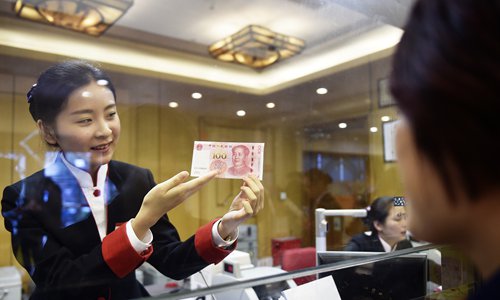Issue, circulation of digital yuan under the same legal guideline as cash
Source: Global Times Published: 2020/9/14 17:08:40

An employee holds a 100-yuan note at a bank in Hangzhou, capital of East China's Zhejiang Province. File photo: VCG
China's digital yuan is a statutory currency and its issue and circulation needs to be regulated in accordance with relevant rules designed for the cash, said deputy head of the country's central bank.
The research, development and issue of the digital yuan is in line with the country's legal framework. The central bank law has authorized the People's Bank of China (PBC) to issue the yuan and manage the yuan's circulation, Fan Yifei, deputy governor of the PBC, wrote in a bylined article on Monday.
As a statutory currency, the digital yuan is positioned as M0 money supply, or cash in circulation, meaning it ought to comply with the laws and regulations in regard to cash management including the central bank law and the yuan management regulations, read the article published on Chinese news site financialnews.com.cn.
With the yuan as a fiat currency, the use of a digital currency in the payment of public and private debt within China cannot be refused by any entity or individual, if they are situated to accept the digital currency, Fan said.
The digital currency is also supposed to abide by laws and rules concerning large sums of cash, anti-money laundering, and anti-terrorism financing, according to Fan.
The use of the digital currency in pilot areas needs to be registered when it comes to large deposits or withdrawals and relevant agencies should report large digital currency deals and suspicious transactions to the central bank, said Fan.
PBC Governor Yi Gang revealed in May that internal experimental testing of the central bank's digital currency has been up and running in Shenzhen in South China's Guangdong Province, Suzhou in East China's Jiangsu Province, Chengdu in Southwest China's Sichuan Province and the Xiongan New Area. The digital currency will be used in trial scenarios for the 2022 Winter Olympic Games in Beijing.
Global Times
Posted in: INDUSTRIES,ECONOMY